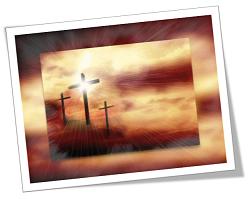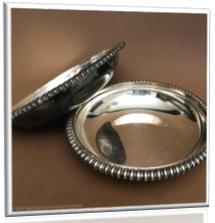Filioque
Filioque
They are three words: and the Son. In Latin it is just one word: filioque. This word states that God the Holy Spirit does not proceed only from God the Father, but also from God the Son. In the western churches this confession has been accepted, but not in the eastern churches. Throughout the ages this has been a topic for discussion. What should we do with this today?
(Dialogue: Somewhere during winter.) Their breath had entwined. In the frosty air you saw the puffs of breath leave their mouths. Two separate air-streams that came together, and subsequently went up in one cloud. “Is that what they mean?” said the one to the other. “The Holy Spirit goes forth from the Father and the Son. If he only goes forth from the Father, then it would only be your breath. And if I am the Son, then I am standing separately by. Is that the error that they wanted to prevent?”
“Is that what they mean?” said the one to the other. “The Holy Spirit goes forth from the Father and the Son. If he only goes forth from the Father, then it would only be your breath. And if I am the Son, then I am standing separately by. Is that the error that they wanted to prevent?”
We so easily sing past the meaning of our words. Hymn 47: “Praise the Spirit, who proceeds from the Father, and the Son”. Hymn 27: “Spirit of the Father and the Son”, and in verse 9: “You, Spirit, proceeded from Both”. How often do we pause at these words? The far-reaching implications of these words affect our entire life of faith. But just as it goes with a well-anchored coat-rack, you don't think about what kind of screws were used to fasten it, until you hear the dull crash. To prevent the fall, you occasionally need to check the screws with which the rack is fastened. That is also what we will do now with the filioque.
Genuinely God⤒🔗
Considering the filioque requires a serious study of the Holy Trinity (Three-in-One). We believe in one God. This living God has revealed himself to us as the Father, and the Son, and the Holy Spirit. God is our Creator, our Redeemer, and Sanctifier. Three Persons – and yet One God. Filioque aims to portray the Godhead of the Holy Spirit in clearly defined words. What is his position in regards to the Father and the Son? He is genuinely God, in that he is of the same being as the Father and the Son. Along with that, he is not more or less. Yet the Holy Spirit is the third person of the three. What now is the position of God's Spirit?
It is fitting that we describe this with much reverence and awe. This also pertains to our meditating on who God is. God has made himself known in Holy Scripture, and he continues to do this as often as we open our Bibles. There we meet “The Holy One”, who by his grace wants to save us, and bring us back to himself.
God, as he reveals himself in his Word, is just like he says he is. What we read in the Bible about him does not just touch on outward things about him – no, we meet him and he lets us see right into his heart. On the basis of what we see in Scripture about God, when we speak of him or when we sing about him, we need never fear that God might change his character or have a change of mind or heart.
We will never come to the conclusion: “I don't know him, because he hid himself in scripture.” God's Name says it all: “I AM, WHO I AM.” If someone doesn't have a name, you can't call him by name. God gave us his Name, and already lets us know in that Name that he is trustworthy.
The Good Relationship←⤒🔗
Between the Father, the Son, and the Holy Spirit, there is a loving, intimate relationship. The relationship between the Father and the Son is about on the Fatherhood (John 5:26); the relationship between the Son and the Father is about the Sonship (Hebrews 1:5). The Father-Holy Spirit relationship is that of proceeding from the Father (John 15:26), and the relationship between the Son and the Holy Spirit is described using the same words. He is also named Spirit of Jesus, or Spirit of Jesus Christ (Acts 16:7, and Philemon 1:19).
We will now attempt to portray the relationship between the Spirit and the Father, and the Spirit and the Son. God the Father sent his Son into the world. Jesus Christ had as his task to redeem his people, to pay the penalty for their sin, for those whom the Father had given him. As a result, he has been deemed the only way to God (1 Timothy 2:5-6; John 17:9-10). The resurrection after his death on the cross is proof that the Father accepted his sacrifice. His work was gloriously done. God's future for us is realized only in what our Lord Jesus Christ has done for us!
After his resurrection he went to heaven to reign victoriously and to aid us in our strife. For us, the most important event after Jesus’ entry into heaven is the outpouring of the Holy Spirit. He was sent by both the Father and the Son (John 16:7; Acts 2:33; Galatians 4:6).
Sent Out by Both←⤒🔗
The task of the Holy Spirit is to complete the work of Jesus Christ in the lives of the elect. We see that beautifully described in Romans 8:9-17. The Spirit of God, who is also called the Spirit of Christ, makes us alive. He gives us the freedom that Jesus Christ has earned for us, and teaches us to live in that freedom. With that aim in mind, he has been sent out by the Son. In other words: he takes the lead in our liberated condition before God, as sons and daughters who dare to call to their “Abba” (Father), and live according to his will. With that aim, he was sent by the Father (Galatians 4:6). In this way he teaches us the right relationship to God. We may worship the Father in his amazing love toward us – even before we knew him! – in the sending of his Son!  We're able to do that because of the grace that the Son shows us in his suffering and resurrection, and because we share in his suffering and also in his coming glory. The Spirit works all of this in our hearts, and undergirds and strengthens our adoration and love (Romans 8:16, 26). God's future for us is made possible by the working of the Holy Spirit!
We're able to do that because of the grace that the Son shows us in his suffering and resurrection, and because we share in his suffering and also in his coming glory. The Spirit works all of this in our hearts, and undergirds and strengthens our adoration and love (Romans 8:16, 26). God's future for us is made possible by the working of the Holy Spirit!
This activity towards God that the Spirit sets in motion is not only seen in the church. The Spirit is also busy in the world (John 14:8-11) After all, the Father had sent his Son into the world, because he loved the world (John 3:16), and the Son died not only for our sins, but for the sins of the whole world (1 John 2:2). In his love, God also remembered his creation. All of creation is groaning and eagerly longing for the new creation. The gift of the Holy Spirit is our guarantee that a new heaven and earth with renewed people is awaiting the children of God (Romans 8:20-23).
Derailment←⤒🔗
It is important to have the filioque as part of our creeds, but even more important is to really know what we must believe according to Scripture. There is always the danger of derailments:
- The eastern churches think of God as a family. The One-ness of God (The Godly family) is carried by God the Father. In this way, filioque threatens the One-ness of God, because it speaks of the Holy Spirit proceeding from the Father and the Son. Then you have two Gods. For Christians in the western churches, these criticisms are hard to follow. Many speak with great confidence about the Holy Trinity. Until I noticed that many believers think of God the Father as completely separate from the Lord Jesus Christ. In our words, God is One, but in actual practice we serve two gods: God and Jesus Christ. God takes care of us, and Jesus died for our sins. Besides that, the Holy Spirit is often no more than a “power”. The result is that for our daily life we don't have high expectations of this Triune God, and our faith remains stuck in superficiality.
- Another danger is that the Holy Spirit is given a position under the Son, as if he is an extension of Jesus Christ. That danger is there for everyone who believes the compromising formula “from the Father, through the Son”. If we place the Spirit under the Son, we can state that our salvation is something that has happened: Our redemption and future is fully realized through Jesus Christ, and we know that through God's Spirit. But we forget that God's future for us is being realized through the working of the Holy Spirit. This is still something he is doing now.We arrive and stay on the way of Christ through the Spirit. We are dependent on HIM!
- The Eastern churches neglect the relationship between the Son and the Spirit. That's why they claim two ways to God. This is a result of their view of salvation. Their salvation is not central, but involves the new life,
 or even deification, of becoming one with God. Through Christ we are reconciled to God. That is, then, one way. Aside from that, we can become one with God through the Spirit. That is the way of Mysticism. Then we enter into the godly family and already celebrate with them the new life (right now!). In their practice of this faith, the focus is on Mysticism. Christ and his saving work becomes secondary, while he is the only Mediator between God and man (1 Timothy 2:5). Besides that, this creates a division between the spiritual/heavenly and the every-day existence, which is considered of less value.
or even deification, of becoming one with God. Through Christ we are reconciled to God. That is, then, one way. Aside from that, we can become one with God through the Spirit. That is the way of Mysticism. Then we enter into the godly family and already celebrate with them the new life (right now!). In their practice of this faith, the focus is on Mysticism. Christ and his saving work becomes secondary, while he is the only Mediator between God and man (1 Timothy 2:5). Besides that, this creates a division between the spiritual/heavenly and the every-day existence, which is considered of less value. - As a last derailment, I want to mention the over-emphasis on the work of the Spirit, though they do recognize filioque – the only way to God is via Christ Jesus. But there is a one-sided emphasis on our total dependence on the Holy Spirit, through whom we have to be born anew. You learn to be very unsure of yourself - insignificant and sinful. This mistrust can go so far as to even doubt your salvation. The assurance about the future that Jesus HAS obtained for us is undermined by the belief that the Spirit still has to work on this future, and who is to say how far he is? Under the best of circumstances, this kind of faith brings a lot of pessimism about the renewal God's Spirit brings. The words of the Bible that speak of the victory we have in Jesus Christ (1 John 2 and 5) become empty of meaning because of a paralyzing overemphasis on sin. You see a waiting attitude towards God instead of a seeking after holiness (Philippians 3:12-16)
“Yes”, replies the other. “That was the idea. They wanted to say that each of the Three were their own Person with their own work, and yet, God is one in work and being. You see, understanding improves when you use examples.”
The first ecumenical Council of Nicea (325 A.D.): “We believe in one God, the Father…: and in one Lord, Jesus Christ… and in the Holy Spirit.”
The second ecumenical Council of Constantinople (381 A.D.): “We believe in one God, the Father…; and in one Lord, Jesus Christ…; and in the Holy Spirit, the Lord and Giver of life, who proceeds from the Father and the Son, who with the Father and the Son together is worshipped and glorified; who spoke by the prophets...”
A quick dive into history teaches that the content of the filioque originated with Augustine. The phrase “and the Son” was known as the “Filioque”, and this expression itself was used for the first time in Spain in the 5th century. A synod in Toledo added this expression to the creed that had been agreed upon in the second ecumenical council in Constantinople. In the ninth century, Karl the Great had it added to the confessions. He would have liked to see the Pope in Rome also do this, but the Pope resisted the emperor's pressure. Pope Leo III didn't disagree with the addition of the Filioque.  But still, he placed two silver plates in the portals of St. Peter's in Rome. On these two plates are engraved the unchanged, original text of the confessions. Only in the 11th century (1014 A.D.) at the crowning of the new emperor did the addition of the Filioque take its place in Roman liturgy. At that time a power struggle ensued between the eastern and western churches. After this, the western churches changed the ecumenical confession to include the Filioque. In 1054 A.D., the break with the Eastern churches became definite.
But still, he placed two silver plates in the portals of St. Peter's in Rome. On these two plates are engraved the unchanged, original text of the confessions. Only in the 11th century (1014 A.D.) at the crowning of the new emperor did the addition of the Filioque take its place in Roman liturgy. At that time a power struggle ensued between the eastern and western churches. After this, the western churches changed the ecumenical confession to include the Filioque. In 1054 A.D., the break with the Eastern churches became definite.
The Filioque has a long and bitter history. The re-uniting of the eastern and western churches again and again is halted by this one Latin word – filioque. In 1438/39 A.D. a valiant effort was again made to reach an agreement with the words “the Spirit, goes out from the Father through the Son”, but at the last moment failed. In the late 1970s and early 80s there was an effort within the World Council of Churches for reconciliation between the eastern and western churches, but it didn't succeed. In 1980 Mr. Moltmann suggested the inclusion of “The Holy Spirit proceeds from the Father and the Son.” The Reformed Churches in the Netherlands were also busy with the filoque at this time because of their contact with the Greek Evangelical Church.

Add new comment